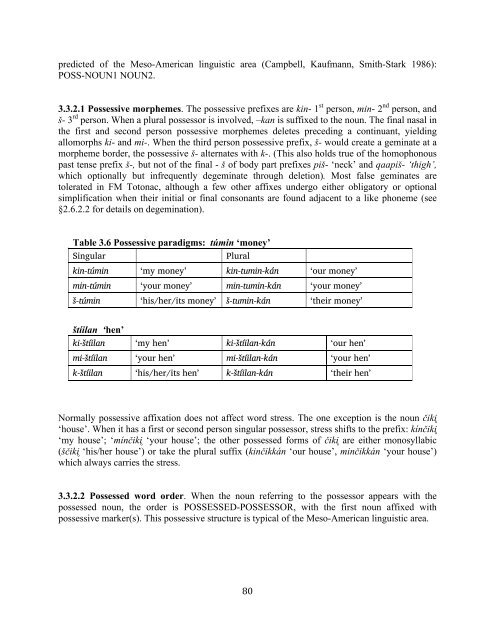The phonology and morphology of Filomeno Mata Totonac
The phonology and morphology of Filomeno Mata Totonac
The phonology and morphology of Filomeno Mata Totonac
You also want an ePaper? Increase the reach of your titles
YUMPU automatically turns print PDFs into web optimized ePapers that Google loves.
predicted <strong>of</strong> the Meso-American linguistic area (Campbell, Kaufmann, Smith-Stark 1986):<br />
POSS-NOUN1 NOUN2.<br />
3.3.2.1 Possessive morphemes. <strong>The</strong> possessive prefixes are kin- 1 st person, min- 2 nd person, <strong>and</strong><br />
#- 3 rd person. When a plural possessor is involved, –kan is suffixed to the noun. <strong>The</strong> final nasal in<br />
the first <strong>and</strong> second person possessive morphemes deletes preceding a continuant, yielding<br />
allomorphs ki- <strong>and</strong> mi-. When the third person possessive prefix, #- would create a geminate at a<br />
morpheme border, the possessive #- alternates with k-. (This also holds true <strong>of</strong> the homophonous<br />
past tense prefix #-, but not <strong>of</strong> the final - # <strong>of</strong> body part prefixes pi#- ‘neck’ <strong>and</strong> qaapi#- ‘thigh’,<br />
which optionally but infrequently degeminate through deletion). Most false geminates are<br />
tolerated in FM <strong>Totonac</strong>, although a few other affixes undergo either obligatory or optional<br />
simplification when their initial or final consonants are found adjacent to a like phoneme (see<br />
§2.6.2.2 for details on degemination).<br />
Table 3.6 Possessive paradigms: túmin ‘money’<br />
Singular Plural<br />
kin-túmin ‘my money’ kin-tumin-kán ‘our money'<br />
min-túmin ‘your money' min-tumin-kán ‘your money'<br />
s%-túmin ‘his/her/its money' s%-tumin-kán ‘their money'<br />
#tíilan ‘hen’<br />
ki-s%tíilan ‘my hen’ ki-s%tíilan-kán ‘our hen'<br />
mi-s%tíilan ‘your hen' mi-s%tíilan-kán ‘your hen'<br />
k-s%tíilan ‘his/her/its hen' k-s%tíilan-kán ‘their hen'<br />
Normally possessive affixation does not affect word stress. <strong>The</strong> one exception is the noun $iki"<br />
‘house’. When it has a first or second person singular possessor, stress shifts to the prefix: kín$iki"<br />
‘my house’; ‘mín$iki" ‘your house’; the other possessed forms <strong>of</strong> $iki" are either monosyllabic<br />
(#$iki" ‘his/her house’) or take the plural suffix (kin$ikkán ‘our house’, min$ikkán ‘your house’)<br />
which always carries the stress.<br />
3.3.2.2 Possessed word order. When the noun referring to the possessor appears with the<br />
possessed noun, the order is POSSESSED-POSSESSOR, with the first noun affixed with<br />
possessive marker(s). This possessive structure is typical <strong>of</strong> the Meso-American linguistic area.<br />
! ,.!

















